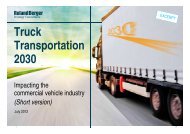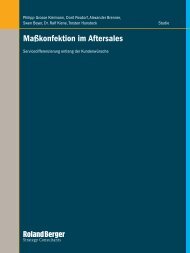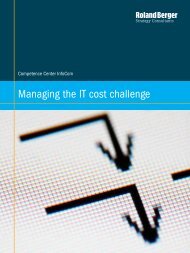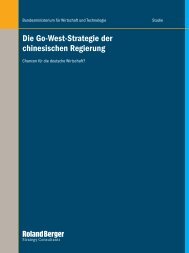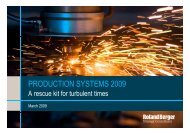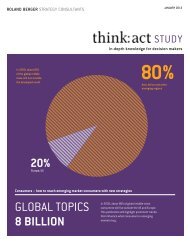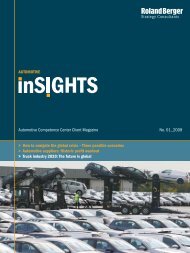Truck industry 2020: The future is global - Roland Berger
Truck industry 2020: The future is global - Roland Berger
Truck industry 2020: The future is global - Roland Berger
You also want an ePaper? Increase the reach of your titles
YUMPU automatically turns print PDFs into web optimized ePapers that Google loves.
17 |<br />
<strong>Truck</strong> <strong>industry</strong> <strong>2020</strong>: <strong>The</strong> <strong>future</strong> <strong>is</strong> <strong>global</strong><br />
Other important players include Eicher Motors, which has a 6% share<br />
of the overall truck market, and Swaraj Mazda. Of the international truck<br />
OEMs, Volvo currently sells a few vehicles in the medium- and heavy-duty<br />
segment. Scania, too, produces robust heavy-duty commercial vehicles for<br />
the construction segment that are basic and technologically less soph<strong>is</strong>ticated<br />
versions of its ex<strong>is</strong>ting models.<br />
In 2006, MAN formed a joint venture with Force Motors, building a plant<br />
in Pithampur (between Mumbai and Delhi) with the capacity to roll out<br />
24,000 light to heavy-duty commercial vehicles. <strong>The</strong> plan <strong>is</strong> to export 50%<br />
to Asia, Africa, the Middle East and Eastern Europe. MAN plans to pair its<br />
leading-edge technology with the low-cost capabilities of Force Motors,<br />
thereby building vehicles that sat<strong>is</strong>fy MAN's high quality standards at a<br />
significant cost advantage. At about the same time, IVECO signed a memorandum<br />
of understanding with Tata. <strong>The</strong> aim here was to explore options<br />
for cooperating on production and development.<br />
Another new player on the market <strong>is</strong> Daimler. Unlike MAN and IVECO,<br />
however, Daimler's plans to work with a local partner – in th<strong>is</strong> case India's<br />
Hero Group – have been thwarted by Hero's withdrawal from the planned<br />
joint venture. Even so, the German company remains committed to local<br />
production in India and now intends to go it alone, producing light,<br />
medium-duty and heavy-duty commercial vehicles as of 2010. Initially,<br />
slimmed-down versions of Daimler's premium Axor heavy-duty and Fuso<br />
Canter light duty models will be launched for the local market.<br />
Local players, too, are expanding both within India and internationally.<br />
Tata, for example, has extended its reach to other emerging countries by<br />
acquiring Daewoo Commercial Vehicle Company in South Korea and the<br />
Brazil-based bus and coach body maker Marcopolo Motors Ltd. (TMML).<br />
Meanwhile, one of Ashok Leyland's plans <strong>is</strong> to invest around INR 60 billion<br />
(nearly EUR 900 million) in the commercial vehicle segment. Part of th<strong>is</strong><br />
money will be used to expand annual production capacity from 83,000 to<br />
100,000 units. At the same time, the company <strong>is</strong> stepping up internationalization<br />
with a view both to other emerging markets and the triad markets.<br />
In 2006, Ashok Leyland snapped up Avia's Prague-based truck business.<br />
Two years later, it committed to a joint venture with N<strong>is</strong>san Motors Co. Ltd,<br />
Japan, whose m<strong>is</strong>sion <strong>is</strong> to develop and produce light commercial vehicles<br />
for both domestic and export markets.





